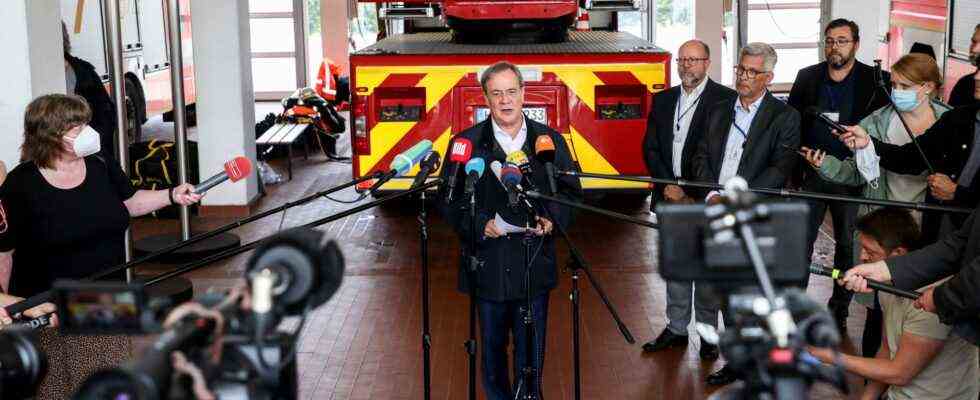analysis
Status: 07/16/2021 7:39 p.m.
The severe weather disaster is also a challenge for politicians. Union candidate and NRW Prime Minister Laschet is suddenly the focus of criticism. But what does that mean for the election?
An analysis by Jochen Trum,
WDR
Talking to someone about the weather has long been synonymous with triviality. It’s over. The weather is highly political, there is hardly any non-political weather, especially not during the election campaign.
Politicians are now experiencing this again. Armin Laschet, CDU Prime Minister of North Rhine-Westphalia and a very promising applicant for the Chancellery, can do a lot wrong in these hours and days, but only make a few right. There is a lot at stake for him. It is now a matter of showing thanks, sympathy and the ability to act politically.
On Friday morning, the state cabinet intervened and decided on emergency aid. At this point, no one can say how much money will be required. The situation is still too confusing. It should be a large sum, as government officials can see.
Laschet and his Interior Minister Herbert Reul (CDU) are clearly under the impression of the events. You speak of “storms of the century” and “a catastrophe of historic proportions.” While they are talking to the media on the eleventh floor, high above Düsseldorf, only about 50 kilometers as the crow flies, in Erftstadt, the helpers are fighting for human lives.
Canceled CSU exam
When the sluices of heaven opened in his home country on Wednesday and the water sank entire regions, Laschet was in Baden-Württemberg, in Stuttgart. After a few hours of hectic phone calls between Stuttgart, Berlin and Düsseldorf, he decided in the evening to cancel the planned CSU retreat in Bavaria and drive to Hagen, where the storm hit particularly hard.
“We will not leave the municipalities, those affected, alone,” he explained in front of the backdrop of a fire engine, “but as a state we will also provide help here so that North Rhine-Westphalia stands together in solidarity in this situation and we can also cope with the consequences of this disaster together in solidarity. ”
The opposition in Düsseldorf did not spare criticism on Thursday. She complains that the state government has not directly set up a crisis team. That is “completely incomprehensible”. She also blames Prime Minister Laschet for reacting too late. “It would have been good,” said Verena Schäffer, leader of the Greens, “if the Prime Minister also addressed empathetic words to the citizens of North Rhine-Westphalia.”
When Kraft underestimated the subject
In North Rhine-Westphalia, many involuntarily remember the former Prime Minister Hannelore Kraft (SPD) and how she dealt with a local storm in Münster that claimed deaths. It was days before anything was heard in public, and it was four weeks before she visited the city. The political damage was enormous, and the former hopeful of social democracy has not really recovered from it. So the greatest danger for rulers is to underestimate the issue. This knowledge is considered common knowledge in politics in Düsseldorf today.
Politically, climate-driven natural disasters are now difficult terrain for those responsible. In the past, you could score points as crisis managers in rubber boots. Gerhard Schröder (SPD) during the Elbe flood in 2002 is probably the best-known example. But today they are jointly liable, whether they are confronted with their own failures of the past or with insufficient concepts for the future.
With full force
The CDU chancellor candidate is now hit with full force, especially on social media. His on-site visit, his climate policy, a statement in an interview with the WDR, everything is examined there and found to be unsuitable. Recently others were in purgatory of the election campaign, now it is Laschet.
In North Rhine-Westphalia, the political style and understanding of office that all heads of government have had so far that one is perceived as the father or mother of a country in crisis situations. Caring, compassionate, authentic. Hannelore Kraft succeeded in doing this in a special way in 2010, after the Love Parade catastrophe with 21 deaths.
So does it mean for Laschet to play the official bonus? After all, a common recipe for coping with crises in politics. At the beginning of the corona pandemic and in the early phase, it worked across Germany, and approval for the Union grew rapidly. Acting prime ministers from other parties were also able to benefit from this in state elections.
Who will benefit in September? That probably depends on how long the topic has been in the top spot in the public eye. Thematic booms are now highly capricious, moods volatile. It is possible that in a few days everyone will be talking about other topics again.
No automatism
It seems reasonable to assume that the Greens could score points by paying more attention to everything to do with climate. Experience shows that they have the highest attribution of competencies in this policy area. But it is not automatic. Perhaps one of the consequences is that the election campaign is now coming to a head with a duel between Armin Laschet and the Green top candidate Annalena Baerbock.
Even if the west of the republic, North Rhine-Westphalia and Rhineland-Palatinate, is currently badly affected, not the whole country looks at the events with the same disbelief and sympathy as the people in the affected regions. There are still more than ten weeks until the election. The last few days have shown that a lot can change in just a few hours.

